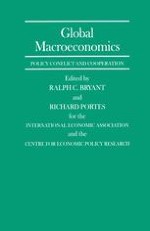1987 | OriginalPaper | Buchkapitel
International Cooperation and Reputation in an Empirical Two-Bloc Model
verfasst von : David Currie, Paul Levine, Nic Vidalis
Erschienen in: Global Macroeconomics: Policy Conflict and Cooperation
Verlag: Palgrave Macmillan UK
Enthalten in: Professional Book Archive
Aktivieren Sie unsere intelligente Suche, um passende Fachinhalte oder Patente zu finden.
Wählen Sie Textabschnitte aus um mit Künstlicher Intelligenz passenden Patente zu finden. powered by
Markieren Sie Textabschnitte, um KI-gestützt weitere passende Inhalte zu finden. powered by
This paper is concerned to examine three themes. First, we wish to investigate whether, and in what circumstances, it is advantageous for governments to cooperate internationally in the conduct of macroeconomic policy. Second, we wish to investigate whether it is advantageous in terms of economic performance for governments to establish reputations vis-à-vis the private sector. Third, we wish to examine the sustainability of cooperative and reputational policies. We address these questions in the context of an empirical two-bloc model derived from the OECD Interlink model. In previous empirical work (and in almost all the theoretical work), these three questions have been addressed separately. Here we address them jointly, and with striking conclusions. Our main results may be summarized as follows. To realise the gains from international cooperation requires reputation; and to realise the gains from reputation requires cooperation. Moreover, cooperative policies with reputation are found to be sustainable; and the joint gains from cooperation and reputation are considerable.
